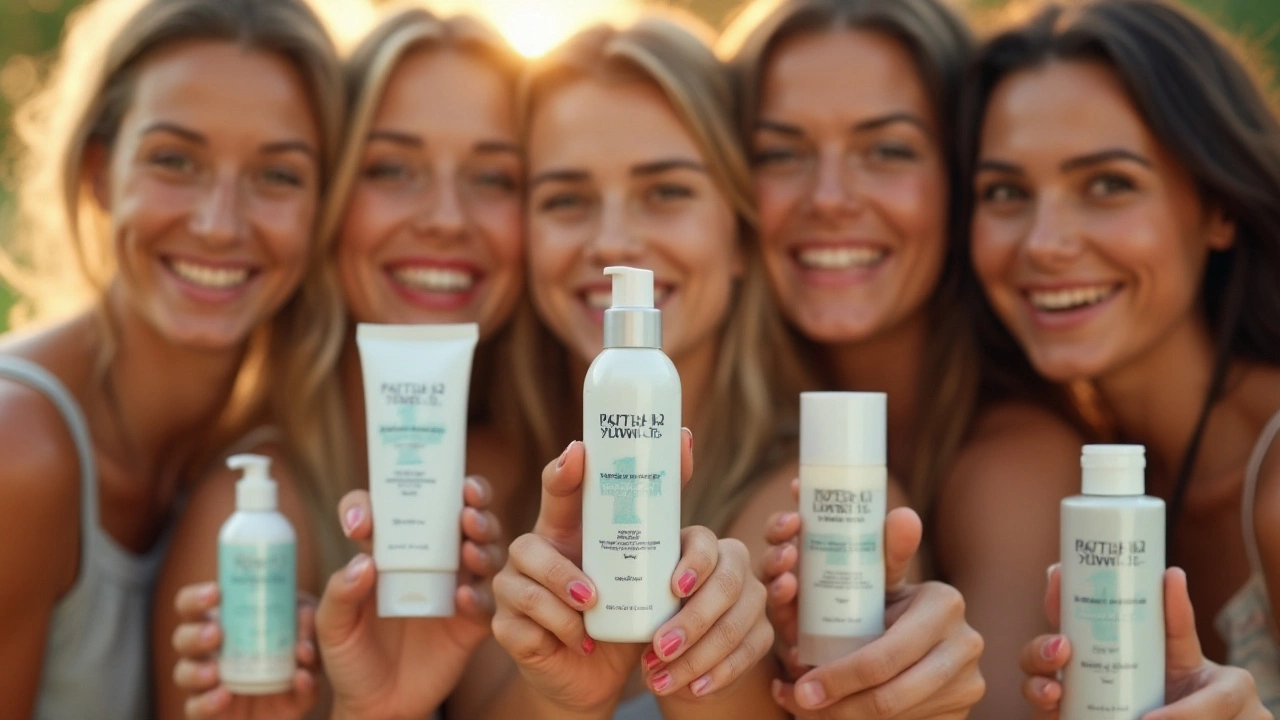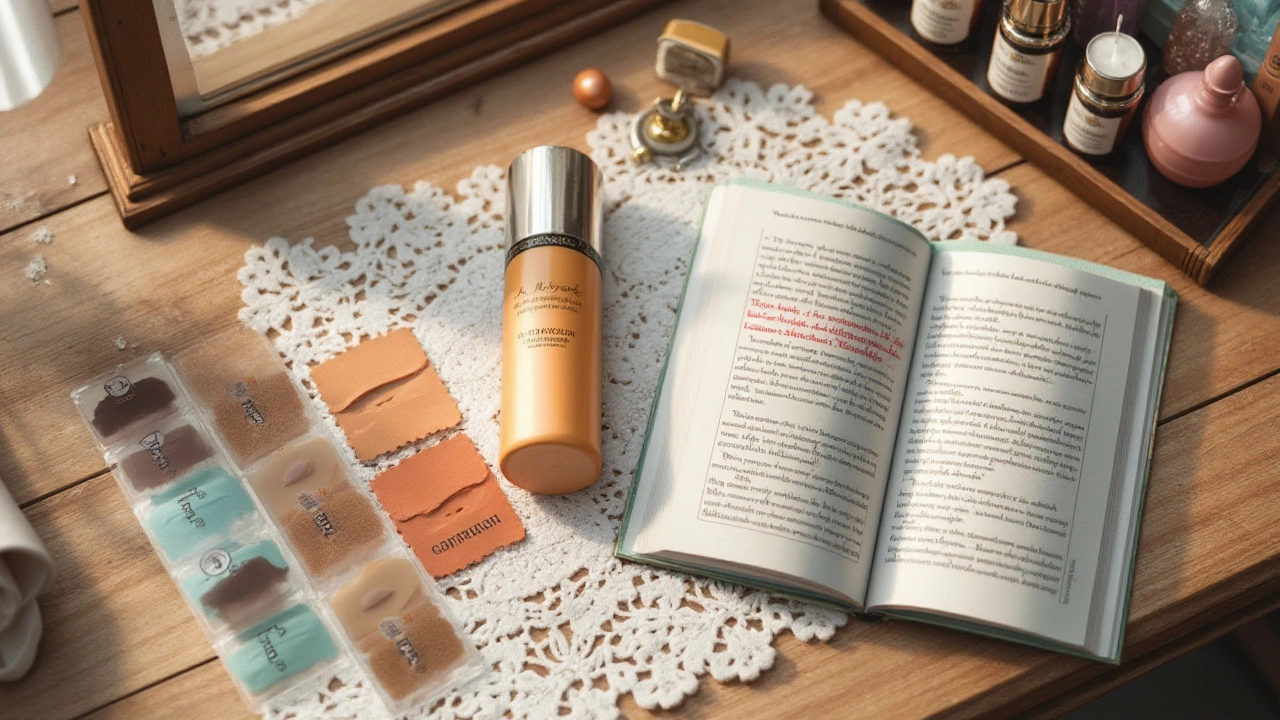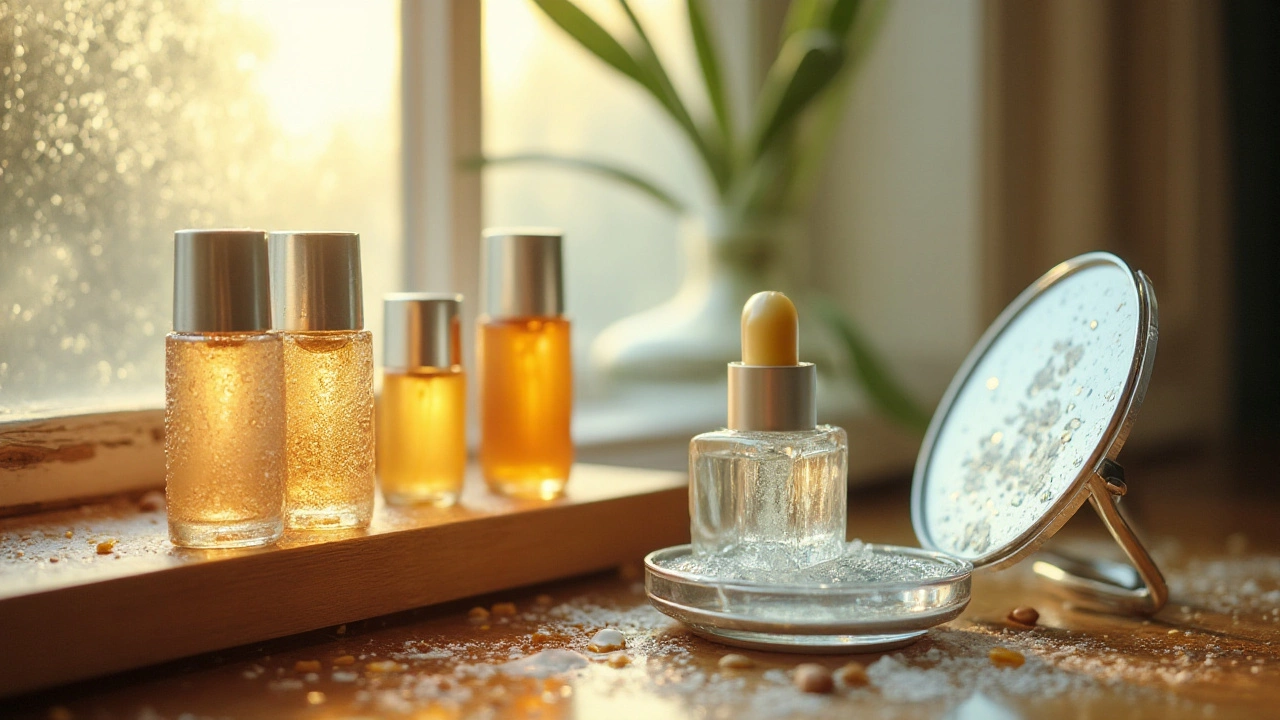In the world of beauty and skincare, moisturizers hold a significant place, and they are more essential than merely a seasonal necessity. The intriguing debate about whether moisturizers qualify as cosmetics arises from their dual nature. Moisturizers are not only appreciated for their ability to support the skin's hydration levels but also for enhancing a person’s appearance.
While cosmetics are usually defined as products applied to the body to enhance beauty, moisturizers bridge both skincare and cosmetic benefits. As daytime routines evolve and personal care advances, understanding the role of moisturizers has become more relevant, aiding in making informed choices for radiant, healthy skin.
- Defining Cosmetics
- The Multifaceted Role of Moisturizer
- How Moisturizers Enhance Appearance
- Selecting the Right Moisturizer
- Understanding Ingredients: What to Look for
- Integrating Moisturizer in Your Daily Routine
Defining Cosmetics
Defining what constitutes a cosmetic product can sometimes feel like looking through a kaleidoscope—each angle presenting a new perspective. At its core, a cosmetic is broadly considered any substance or mixture intended to be applied on various parts of the human body. These might include the skin, hair, nails, lips, and even teeth, all aimed at cleansing, beautifying, and adding sophistication or altering appearance. This definition, outlined by entities like the U.S. Food and Drug Administration (FDA), helps us distinguish these products from others, such as medical treatments, which are designed to cure or prevent disease, rather than solely enhance looks.
The widespread definition also opens up a wide array of possibilities for what products can fall under the 'cosmetics' umbrella, and significantly, this includes moisturizer in many instances. Moisturizers, with their dual roles of hydrating the skin and improving texture and appearance, often sit comfortably in this category. They bridge the gap between functional skincare, which maintains the skin in optimal condition, and cosmetic enhancement, which boosts the user’s visible allure. According to the Cosmetic Ingredient Review (CIR) Expert Panel, a foundation in the cosmetic industry, “Cosmetics represent products applied to the exterior of the body, including makeup that improves or alters the beauty of the user.”
Understanding the scope of cosmetics ultimately allows consumers to make more informed decisions about what goes into their beauty routine and why. Cosmetic products are crafted not only to impart beauty but also to, in certain cases, protect the body. Consider sunscreens, which, while beautifying the skin with a minimal tan, simultaneously shield against harmful UV rays. Therefore, the realm of cosmetics is as much about function as form, where lines blur and definitions intersect, all in the interest of enhancing human appearance in safe, regulated ways.
Today’s cosmetic marketplace brims with innovative blends, each promising unique benefits. A comprehensive examination of labels reveals multiple ingredients like humectants for moisture retention, emollients for smoothness, and even botanicals aimed at rejuvenating tired skin. These diverse elements collectively contribute to the evolution of modern cosmetic products, where skincare attributes intertwine with beautification. Such an understanding effortlessly supports the position of moisturizer as a noteworthy contender in the cosmetic universe—a role that it embraces warmly, meeting the diverse needs of skincare enthusiasts globally.
It might surprise some to know that, in varying cultures and across history, the concept of beauty and body enhancement with available resources has been an ongoing tradition. From Cleopatra's infamous milk baths to Victorian-era face powders, there's ample proof in the corridors of time showing humanity's unwavering commitment to enhancement through cosmetics. This broad perspective allows modern consumers to appreciate the heritage and sophistication embedded within each skincare and cosmetic product they adore today, including that simple bottle of moisturizer perched on their bathroom shelf.
The Multifaceted Role of Moisturizer
Moisturizers, in the realm of skincare, are celebrated for their capacity to transcend the basic expectations of beauty products. They fulfill a variety of roles which makes them indispensable in our daily beauty routine. Essentially, a moisturizer is designed to hydrate the skin by trapping water in the outermost layer, which can be a significant boon for individuals residing in dry climates or who spend a considerable amount of time indoors with air conditioning or heating systems that sap moisture from the air.
Yet, the use of moisturizers goes beyond mere hydration. They also serve as a protective barrier against environmental pollutants and harsh weather conditions, shielding the skin from potential damage. This protective quality is especially important in urban areas where pollution levels can be quite high. Many moisturizers now incorporate ingredients that provide sun protection, such as SPF, which helps prevent the premature aging effects linked to UV exposure and hyperpigmentation. According to Dr. Lisa Kellett, a dermatologist known for her research in cosmetic dermatology, "Moisturizers with added sun protection can significantly delay the onset of sun-induced skin damage."
Moisturizers with added sun protection can significantly delay the onset of sun-induced skin damage. - Dr. Lisa Kellett
Moreover, moisturizers have the ability to soothe and calm the skin, providing relief from irritation and inflammation. This is particularly beneficial for those with sensitive skin conditions such as eczema or rosacea. Ingredients like aloe vera, chamomile, and oat extracts are frequently included for their calming properties. The emotional comfort from using moisturizers not only nurtures the skin but also offers a relaxing self-care ritual.
A lesser-known aspect of moisturizers is their ability to enhance the efficacy of other skin treatments. When applied after serums or treatment products, they can lock in the beneficial effects, ensuring that active ingredients have more time to work on the skin. This synergy can amplify results, leading to smoother, firmer, and more radiant complexion. In cold climates, this layered approach becomes even more beneficial in retaining moisture and nourishing the skin.
To cater to a diverse audience, the market offers a variety of formulations—light ones for oily skin, rich creams for dry skin, and gel-based formulas for those desiring a non-greasy finish. The inclusion of natural and exotic ingredients such as hyaluronic acid, shea butter, or even algae extract can promote different skin benefits, reflecting the widespread, customizable nature of current moisturizer offerings. Understanding this multifaceted role aids in choosing products that align with one's aesthetic and health goals, ensuring that the skin remains an immaculate canvas for one's beauty.

How Moisturizers Enhance Appearance
Moisturizers play a pivotal role in enhancing one's appearance by providing essential hydration that helps the skin look fresh and vibrant. When the skin is adequately moisturized, it maintains its suppleness, which can significantly reduce the appearance of fine lines and wrinkles. Hydration is key in maintaining the skin's elasticity, which naturally makes the skin appear smoother and more youthful. People often notice that their skin feels softer and looks more radiant when it is properly moisturized, showcasing a natural glow that is hard to achieve without the aid of a good moisturizer.
The protective barrier that moisturizers create on the skin helps to lock in hydration, which is crucial to prevent the loss of moisture in dry environments or as we age. This barrier function also protects the skin from external aggressors such as pollution, wind, and UV rays, all of which can accelerate skin aging and lead to a dull complexion. By forming this protective layer, moisturizers help in maintaining the skin's integrity, promoting a healthy-looking surface that reflects light better, enhancing the skin's natural brightness and tone.
Moreover, many moisturizers today are infused with additional ingredients like hyaluronic acid, glycerin, or vitamin C, which not only hydrate but also provide other cosmetic benefits. For example, hyaluronic acid is known for its incredible ability to retain hydration, plumping the skin and making it appear fuller and more youthful. Vitamin C, known for its brightening properties, can reduce discoloration and even out skin tone, contributing to an enhanced complexion. Such ingredients make skincare products invaluable tools in the beauty industry, marrying health benefits with aesthetically pleasing results.
Cassandra Bankson, a skincare enthusiast and beauty expert, once mentioned, "A good moisturizer is like a glass of water for your face; it quenches your skin's thirst, making it look alive and glowing."
Moisturizers are versatile and adaptable to every step in a beauty routine, seamlessly complementing other products such as serums and foundations. By providing a hydrated base, moisturizers allow makeup to apply more evenly and last longer, creating a smoother canvas that enhances the overall appearance. Makeup applied on well-moisturized skin is less likely to settle into imperfections, thus maintaining a flawless look throughout the day. This combination of hydration and protection ensures that one's skin not only feels good but looks great, offering both immediate and long-term enhancements to one’s overall appearance.
Selecting the Right Moisturizer
Choosing the ideal moisturizer can often feel like navigating a maze, especially given the sheer variety available in the market. Your skin’s unique needs should be the compass guiding this selection. It's crucial to understand your skin type first: oily, dry, combination, or sensitive. Each type requires a specific formulation to address its distinct challenges. For instance, if you're dealing with oily skin, opt for non-comedogenic lotions that help prevent clogging pores while still delivering adequate hydration. Alternatively, those with dry skin might benefit significantly from heavier creams that offer intense moisture retention, quenching thirsty skin cells.
Moreover, contemplating your daily environment is equally important. The moisturizer you choose should align with your living conditions. For instance, hot and humid climates might necessitate lightweight gels, whereas, in colder regions, richer creams form a protective barrier against harsh winds. Ingredients also play a pivotal role in functionality. Hyaluronic acid is celebrated for its ability to hold up to 1000 times its weight in water, making it a star ingredient for hydration. Meanwhile, glycerin and ceramides provide similar benefits, enhancing the skin’s natural barrier. Ingredients like retinoids or antioxidants, such as vitamin C, offer additional benefits by targeting aging signs or improving skin tone.
Finding a product that suits your specific needs may involve trial and error. Pay close attention to how your skin responds to various products over time. For those who prefer a scientific approach or want to mitigate trial and error, consulting a dermatologist may expedite the process. As Dr. Samantha Bunting, a renowned dermatologist, once articulated,
“Consistency in a moisturizer regimen, more than any single miracle ingredient, is key to maintaining healthy, glowing skin.”This underscores the importance of routine in achieving optimal results. Beyond this personal journey, sharing experiences with peers can unearth anecdotal insights that might resonate with your skincare preferences, anchoring you further in making an informed choice.
Furthermore, look for evidence of efficacy. Clinical trials and dermatological endorsements lend credibility to product claims, helping you make choices based on sound evidence rather than marketing glamour. Packaging reads can also unveil valuable information; ingredients are typically listed in descending order of predominance. Therefore, prioritize products where beneficial ingredients appear near the top of the list. Don't shy away from researching unfamiliar components; an informed consumer is empowered to make better choices. Finally, remember that our skin often changes with age, requiring adjustments in our moisturizing priorities over time. Staying attuned to these changes ensures that your skincare regimen evolves alongside you, providing lifelong benefits.

Understanding Ingredients: What to Look for
When diving into the vast world of **moisturizer** ingredients, the choices can seem endless and even overwhelming. However, understanding these components is essential for selecting the right product for your skin's needs. At the heart of every effective moisturizer are humectants, emollients, and occlusives. Humectants, such as glycerin and hyaluronic acid, are like magnets for moisture, drawing water into the skin’s surface. They are particularly crucial for keeping skin plump and hydrated. Emollients, such as plant oils and butters, soften and smooth the skin, filling in cracks and rough spots. Occlusives, like petrolatum and dimethicone, form a protective barrier on the skin to prevent further water loss, essential for any **skincare** routine.
Diving deeper into these ingredients can reveal how they interact with different skin types and concerns. For instance, someone with oily skin might benefit more from gel-based moisturizers featuring lightweight humectants like hyaluronic acid, which doesn’t add extra oil to the skin. On the other hand, dry skin types might need richer formulations containing heavier emollients and occlusives to lock in moisture throughout the day. A surprising fact is that many natural oils, such as jojoba and squalane, mimic the skin’s natural sebum, making them excellent emollients for various skin conditions. Knowing your skin’s needs can greatly enhance how effective your chosen product is, making the moisturizer not just a cosmetic enhancement, but a deeply nourishing part of any beauty regimen.
"Selecting the right moisturizer isn't just about choosing the latest brand, it's about understanding what your skin craves and the science behind those ingredients," says Dr. Michelle Green, a Board-Certified Dermatologist.While tackling sensitive skin issues, look for ingredients known for their soothing properties, like aloe vera and chamomile, which can help reduce irritation and redness. For those concerned about aging, ingredients like retinol and ceramides are often sought after for their ability to promote collagen production and reinforce the skin's barrier. With so many products claiming miracle results, it is key to scrutinize ingredient lists and research to make informed, beneficial choices for your **beauty routine**. Consider preservatives and fragrances, which are often the culprits of allergic reactions, and aim for formulations labeled hypoallergenic or 'fragrance-free' if sensitivity is a concern.
To navigate the sea of moisturizing products, it’s helpful to categorize them by their primary active ingredients. Here’s how different ingredients play a part in **cosmetic products** and their impact:
- Hyaluronic Acid: Known for its ability to hold up to 1000 times its weight in water, making it a top choice for intense hydration.
- Niacinamide: A versatile ingredient that addresses a variety of issues from acne to hyperpigmentation, while also improving skin elasticity.
- Peptides: Short chains of amino acids that help to build and repair collagen, ideal for anti-aging formulations.
- Ceramides: Essential lipids that help restore the skin’s barrier, maintaining moisture and protecting against environmental damage.
- Salicylic Acid: Particularly beneficial for acne-prone skin, it exfoliates and helps clear out clogged pores.
Taking the time to familiarize yourself with these **skincare** components can transform not only your understanding of moisturizers but your skin’s health itself. Choose wisely, and your skin will thank you, radiating health and vitality long past application.
Integrating Moisturizer in Your Daily Routine
Incorporating a moisturizer into your daily skincare regimen is a fundamental step that can dramatically affect your skin's health and appearance. The best time to apply moisturizer is immediately after showering or cleansing your skin, as the skin is still damp and can better absorb the hydrating ingredients. Selecting the right type of moisturizer depends heavily on your skin type. For oily skin, a lightweight, oil-free moisturizer can balance hydration without clogging pores. In contrast, dry skin may benefit from a richer cream that provides an intense moisture barrier. Understanding your specific needs is crucial in making the right choice.
Morning routines often demand multitasking products that streamline processes, making a moisturizer with SPF a popular choice. It not only hydrates but also protects against harmful UV rays, assisting in preventing premature aging and sun damage. Many beauty experts emphasize that consistent use of a daily moisturizer can keep skin looking youthful and glowing. The right application technique matters too: Always use upward strokes and never pull downwards, to counteract gravitational forces and promote firmness over time. This small adjustment can amplify the effectiveness of the moisturizer.
Evening routines usually allow for more focused skincare steps, providing an opportunity to use a slightly heavier or treatment-focused moisturizer. Overnight, these creams can renew and deeply nourish the skin, allowing active ingredients to penetrate well during your rest. Some individuals might find it beneficial to use a dedicated night cream that targets specific issues such as wrinkles, pigmentation, or elasticity.
As renowned dermatologist Dr. Emily Petersen said, "Your skin does a lot of its restorative work while you're asleep, so nourishing it with the right ingredients during this time is key."It's also essential to remember the less obvious areas—like the neck and décolleté—that can also benefit from regular moisturizing. These efforts can significantly contribute to an overall even tone and texture from face to chest.
Integrating a moisturizer doesn't just end with choosing the right product and time. Awareness of changing seasons is also vital. The skin requires different levels of moisture through the year, demanding more replenishing in the dry winter months and potentially less during humid summers. Additionally, if you're engaged in an active lifestyle that includes frequent swimming or sports that might wash away your skincare, reapplication becomes critical. Embracing these aspects thoughtfully creates a tailored routine that caters to both your skin's needs and your daily lifestyle, thereby maintaining a balanced and beautiful appearance year-round. Remember, the simplicity of integrating the right moisturizer can be a catalyst for achieving healthy and vibrant skin.

